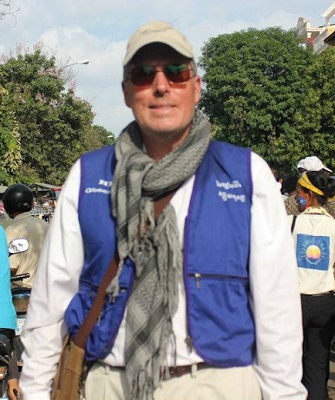
By the time he was six months old, Dorian Roffe-Hammond had already begun experiencing the travel bug.
"My father worked for a financial firm that required him to be transferred frequently from region to region around the United States," said Roffe-Hammond, an SNR graduate student currently pursuing a master's degree in human dimensions.
On his fourth birthday, Roffe-Hammond's French mother took him to visit his grandparents in Paris. By summer's end, he was conversing in French.
"I soon learned to love the adventure that travel brought," he said.
Roffe-Hammond's focus of study is water resources policy and rural regional cooperation in the lower Mekong River region of Southeast Asia. He previously earned a bachelor's degree in geography from Georgia State University in Atlanta.
When not involved in strictly academic pursuits, Roffe-Hammond strives to promote the ideals of community involvement and natural socialism through participatory engagement.
In Atlanta, he taught computer skills to classes of inner-city residents as an AmeriCorps Volunteer. After graduating, he accepted an internship with the U.S. Department of Interior conducting watershed remediation work in abandoned coal mine areas of NE Pennsylvania.
"Acid mine drainage is an enormous problem in most areas of Appalachia," he said. "The tell-tale orange clouds pollute and sterilize streams and rivers of aquatic life."
Since returning to academia after a successful career in the computer industry, Roffe-Hammond has been fascinated with the social and economic dimensions of water.
"As I further explored the subject, I identified the critical issues effecting large river watersheds," he said.
In particular, his attention was drawn to the immense Mekong River that supports the daily lives of 60 million individuals who call this majestic river their home.
"The importance of fish cannot be overstated," he said. "Here's an interesting factoid: Did you know that the Mekong has been designated the sister river of our own Mississippi?"
Last year, Roffe-Hammond realized that he wanted to take some time away from classes.
"I needed an emotional breather, a bit more balance in my hectic student life," he said.
So he expedited his research plans and traveled to Cambodia to experience the country first-hand. During the seven months he lived there, Roffe-Hammond interned with a local human rights advocacy NGO and conducted personal research into agricultural practices.
"I arranged a professional internship with a local NGO named CISA – Coalition for Integrity and Social Accountability – that works with and oversees 33 civil liberties NGOs," he said. "As a result, I had the pleasure of meeting literally hundreds of unique individuals, mostly youth. The young people of Cambodia are thirsty for knowledge and democratic change."
Cambodia is currently undergoing significant economic prosperity after 30 years of civil war that claimed 20 percent of the population. There is overwhelming poverty and ostentatious wealth, which creates a glaring social divide between common citizens and the elites.
Roffe-Hammond examined human rights issues and explored civil society initiatives meant to strengthen community farming practices, create employment opportunities, advocate for free expression and public assembly, promote democratic values and empower women and girls to bolster gender equality.
Land grabs and forced evictions continue, despite official decree to stop economic land concession issued by the prime minister a year ago.
"Cambodians are predominantly Buddhist and embrace the ideal of peace and the sanctity of the family – virtues we have gradually abandoned in the industrialized world," Roffe-Hammond said.
He began using Facebook as a serious social networking tool.
"I've managed to build a huge span of loyal friends and professional acquaintances," he said. "In fact, when I arrived at the airport in Phnom Penh, I was pleasantly surprised to find ten friends waiting for me. That was an amazing feeling."
In addition to using Facebook, Roffe-Hammond manages a personal website that promotes the message of sustainable resource development in the Mekong and supporting civil society movements in Southeast Asia.
Being a Buddhist nation, Cambodia celebrates many religious holidays.
"On national holidays and weekends, I usually joined friends and took short motorcycle trips to cultural sites and rustic rural restaurants overlooking the Mekong River."
Upon his return to Cambodia, Roffe-Hammond wants to work with regional agricultural trade groups using GIS.
"Cambodia does already have excellent GIS technicians and urban planners," he said. "In fact, each month I participated in meetings with the Phnom Penh Mapping Group. We would gather at a restaurant and share presentations and information. That was tremendously valuable experience."
Next summer, Roffe-Hammond will return to Cambodia to complete his field research. In the long-term, he plans to pursue various professional ventures: investigate smallholder coffee farmers who are resurrecting abandoned plantations, collaborate with a Vietnamese hydrology professor specializing in water quality in the Mekong Delta and assist a university group from Australia that is administering a plethora of social issue projects in Laos.
However, his primary focus will be establishing durable, working relationships with smaller provincial cash crop growers who aim to strengthen traditional community food cooperatives for purposes of integrating with regional trade networks.
"Following graduation next year, I will go back there to live and work," he said. "So right now I am teaching myself Cambodian. It's tough going, but not as hard as when I attempted Chinese."
— Written by Dorian Roffe-Hammond
— Edited by Mekita Rivas, Natural Resources